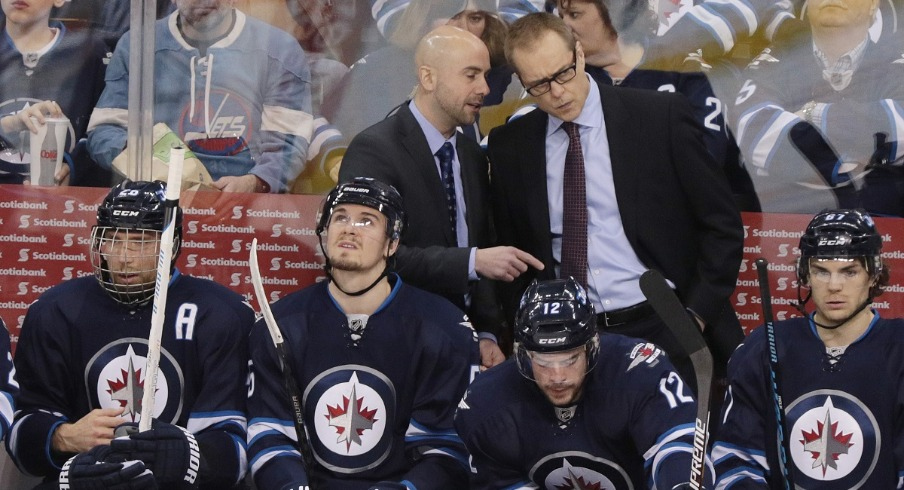On Sunday, the Columbus Blue Jackets announced the resignation of Mike Babcock and the subsequent hiring of Pascal Vincent as their new head coach.
Associate Coach Pascal Vincent has been named Head Coach and has agreed to a two-year contract through the 2024-25 National Hockey League season pic.twitter.com/1a75riPy4E
— Columbus Blue Jackets (@BlueJacketsNHL) September 17, 2023
With training camp starting this week, there is no time for Vincent to wade into the waters of responsibility. Instead, he must hit the ground running. But he has plenty of challenges, both on and off the ice, that need to be addressed.
Vincent, who turns 52 later this week, is hardly unworthy of the head coaching job and has more than paid his dues in the NHL as a long-time assistant coach and as an AHL head coach for five seasons. He had twice been considered for the head coaching job in Columbus. Still, he was passed over for Brad Larsen, then for Babcock, when it was clear that the organization needed a new, authoritative voice from outside the organization. Challenge one: asserting himself - both internally and externally - as the right person to lead the organization out of what is now an embarrassing season that turned into a humiliating offseason.
That won't be easy. The players and fanbase alike seemed energized by the idea (note: the idea, not necessarily the person) of a well-pedigreed coach with a history of winning games. Vincent has the unenviable task of replacing a person with whom great expectations were placed before one practice even occurred, getting the players' buy-in, while needing to energize a fanbase that is desperately looking for something to cling onto.
That, alone, is a daunting task, but it pales in comparison with 'Challenge two': fixing the potentially fractured locker room. After all, the NHL and NHLPA seemed more than convinced that everything was fine after statements released by veterans Boone Jenner and Johnny Gaudreau, who happen to be a large percentage of the club's official leadership group. But clearly, something shifted when young player(s) were questioned, and now it's obvious that the Babcock experience varied greatly between the old guard and the young core. It's possible that the players hash this out internally, and it's possible that that is already taking place. It's equally likely that there is a rift that must be addressed, and that responsibility would ultimately fall on the head coach.
That point brings other nuance. The franchise was set on jumpstarting the rebuild immediately, and it's not hard to imagine a situation where veteran players (Jenner and Gaudreau are a fair proxy given their statements) were mostly concerned with ending a losing culture while they are still in their prime(s). The young player(s), through no fault of their own, may not have the same perspective. That could easily splinter a locker room. Or it could turn into a rallying cry, an "us against the world" type of messaging that has become commonplace in sport. Either scenario seems equally likely.
Challenge three is a continuation of two: how does Vincent manage the power dynamic between him and his players after going from an assistant to a head coach? Internal promotions can be tricky as the modus operandi often changes from 'good cop' to 'bad cop'. Vincent did fill in at times last year as head coach when Larsen was away from the team, so it's not a totally new experience with this group. But, as a general rule, looking for positives from last season is a fool's errand.
Couple the above with the obvious complications of your former boss being brought in - even/especially with Vincent already present in the organization - and then subsequently removed, and it's complicated. Vincent has graduated from bridesmaid to bride, but I'm sure even he would acknowledge that this wasn't exactly his preferred route to the proverbial altar.
Those are all off-ice challenges. But on the ice, there are more. Challenge four is tactical. Apparently the coaching staff was hard at work this summer looking at league trends and the active roster in an attempt to come up with the optimal combination of systems that would work best for this group. How much of these system changes will be implemented? How will he get across his message to the club? For better or worse, with training camp just a few days away, he will have little time to stew on this. As Elliotte Friedman mentioned on his 32 Thoughts Podcast, it could work in his favor that there is little time to do anything other than what he's best at: coaching. It's also not the first time a controversial head coach has stepped down at the last minute, only to be replaced by a first-time head coach guiding a young team with a bright future. Things worked out okay for the Colorado Avalanche and Jared Bednar, who found himself in the same situation when Patrick Roy resigned in the late summer of 2016.
Other challenges beyond these exist. He'll need to find another assistant coach, and mid-September isn't exactly the best time to be looking to fill out a staff. Who will he bring in? Separately, what happens if the front office is sent packing in the fallout of this debacle? Vincent already has a number of shifting dynamics to face, but at least (for the time being) he can look to a familiar front office for cohesion. And lastly, what if this team struggles out of the gate? Again, Vincent is more than qualified to be an NHL coach. But this is an unusual environment for a first job. If the team struggles, it's not hard to imagine another shakeup. That would hardly be fair to him, but that's a reality he's facing.
Welcome to the throne, Mr. Vincent, and good luck.
